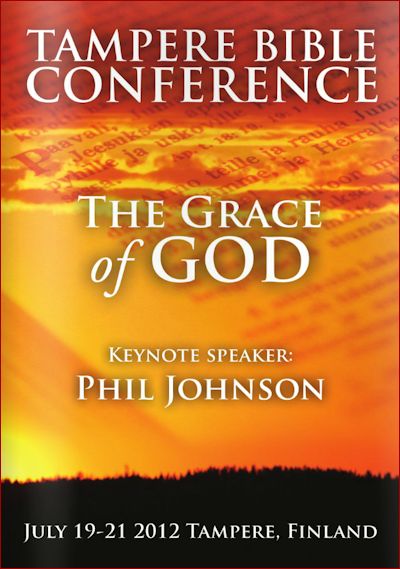
 was listening to a sermon by D. Martyn Lloyd-Jones not long ago in which he pointed out that assurance is one of the most prominent subjects in the New Testament. Virtually every New Testament epistle was written to address some doubt, answer some question, settle some uncertainty—all of them aimed at stimulating or reinforcing the assurance of believers. Scripture encourages us to have assurance. It is not inherently brash or presumptuous to be confident in your faith.
was listening to a sermon by D. Martyn Lloyd-Jones not long ago in which he pointed out that assurance is one of the most prominent subjects in the New Testament. Virtually every New Testament epistle was written to address some doubt, answer some question, settle some uncertainty—all of them aimed at stimulating or reinforcing the assurance of believers. Scripture encourages us to have assurance. It is not inherently brash or presumptuous to be confident in your faith.Shortly after reading that comment by Lloyd-Jones, while doing some research on a totally different theme, I had occasion to review The Canons and Decrees of the Council of Trent. Trent was the Roman Catholic Council that was convened in the mid-1500s in order to hammer out an official response from the Roman Catholic Church to the Protestant Reformation.
And let's be candid: the Protestant Reformation had embarrassed the whole Roman Catholic hierarchy in a major way, because in addition to the many doctrinal errors and patently unbiblical and extrabiblical teachings the Reformers challenged, they also shone the bright light of biblical truth on centuries of exploitation of Papal power, gross corruption of the priesthood, spiritual abuse for material profit (including the sale of indulgences and the sale of church offices and political favors for money). Underneath all of this was the most shocking kind of moral rot that went right to the top in the Papal hierarchy. The Roman Catholic Church was totally corrupt.
The council of Trent cleaned up or papered over some of the more obvious exhibitions of rank clerical debauchery. At the very least we could say that Trent somewhat subdued the unbridled corruption of the medieval priesthood, after generations of abuse and corruption that were the hallmark of the priesthood right across Europe.
One other thing that the Council of Trent accomplished was this: They gave clear definition to certain Catholic doctrines that had always been rather hazy and abstruse—such as the doctrine of justification.
But fundamentally, the Council of Trent was a backlash against Protestant teaching.
The popes and bishops of the 16th century were not at all eager to convene a council to discuss the areas of church life and doctrine that needed Reform. It took years to get the council going. Meetings stretched out over about thirty years' time. The bishops convened in fits and starts, working more or less halfheartedly for the first couple of decades. Only in the council's final stages did they show any enthusiasm for the work. By then, they were so eager to antagonize the Protestants and their doctrines that they cranked out document after document pronouncing anathemas on the Reformers.
And in the process (mainly, I think, because they were more interested in countering the Protestants than they were in clarifying biblical truth on the issues they dealt with), they got major points of doctrine wrong in every set of decrees they issued.
 For example, in their decree on the doctrine of justification (Council of Trent, Sixth session, chapter 9), they said this: "It is not to be said, that sins are forgiven, or have been forgiven, to any one who boasts of his confidence and certainty of the remission of his sins." In other words, while we can know with certainty that God does forgive sins, no individual can say with any settled certainty—based on faith alone—"My sins are forgiven." Even the priest's declaration of absolution is only good until the next time you sin.
For example, in their decree on the doctrine of justification (Council of Trent, Sixth session, chapter 9), they said this: "It is not to be said, that sins are forgiven, or have been forgiven, to any one who boasts of his confidence and certainty of the remission of his sins." In other words, while we can know with certainty that God does forgive sins, no individual can say with any settled certainty—based on faith alone—"My sins are forgiven." Even the priest's declaration of absolution is only good until the next time you sin.The Council of Trent went on to draw this conclusion: "No one can know with a certainty of faith, which cannot be subject to error, that he has obtained the grace of God."
That's why no faithful Roman Catholic can ever really be sure of his or her salvation, even though they have thousands of priests in thousands of confessionals every day telling people that the sins they confess to the priests are forgiven. Those priests are giving people a deadly false assurance, and even Rome's official doctrine acknowledges that.
But Scripture says this (1 John 5:13): "You may know that you have eternal life." "The Spirit himself bears witness with our spirit that we are children of God" (Romans 8:15). "Whoever believes in the Son of God has the testimony in himself. Whoever does not believe God has made him a liar" (1 John 5:10). We're supposed to "be . . . diligent to make [our] calling and election sure" (2 Peter 1:10). Far from saying what the Roman Catholic Church says, that it's sinful—even damnably evil—to be certain that our sins are forgiven and we have received the grace of God—Scripture says, "do not throw away your confidence, which has a great reward" (Hebrews 10:35).
Scripture everywhere commends and encourages assurance. Nowhere are we taught to live in a state of perpetual doubt about our personal standing before God. Never does the Bible suggest that we should rely on the false promises of a mere man in a confessional booth who can never offer anything more than a kind of temporary absolution; a spiritual bait-and-switch offer that can never usher anyone into the true rest that is the birthright of those whose faith is authentic.












 n religion men love far rather to believe abstract doctrines, and to talk of general truths, than the searching inquiries which examine their own personal interest in it. You will hear many men admire the preacher who deals in generalities, but when he comes to press home searching questions, by-and-by they are offended.
n religion men love far rather to believe abstract doctrines, and to talk of general truths, than the searching inquiries which examine their own personal interest in it. You will hear many men admire the preacher who deals in generalities, but when he comes to press home searching questions, by-and-by they are offended.











 any visions have led to the most disastrous results. When Napoleon had a vision of a universal monarchy over which he should preside, with the French eagle for his ensign, he drenched the lands in blood.
any visions have led to the most disastrous results. When Napoleon had a vision of a universal monarchy over which he should preside, with the French eagle for his ensign, he drenched the lands in blood.
 love the idea of unity built on a gospel foundation, but the success or failure of that idea hinges on our understanding of and commitment to a true, unadulterated, biblical understanding of the gospel. We know from both Scripture and the hard-fought lessons of church history that not everyone who says he is committed to the gospel really is. Not everyone who claims to stand with us in affirming gospel truth is really interested in doing the work of the Great Commission. Not everyone who signs an evangelical confession of faith actually preaches the gospel.
love the idea of unity built on a gospel foundation, but the success or failure of that idea hinges on our understanding of and commitment to a true, unadulterated, biblical understanding of the gospel. We know from both Scripture and the hard-fought lessons of church history that not everyone who says he is committed to the gospel really is. Not everyone who claims to stand with us in affirming gospel truth is really interested in doing the work of the Great Commission. Not everyone who signs an evangelical confession of faith actually preaches the gospel. But if we truly want any kind of gospel-based unity, we have to be willing to defend the gospel together. The gospel is not only the ground on which we unite with other believers, it is also ground we must earnestly defend against false teachers. You cannot achieve true unity unless you vigorously pursue both of those goals.
But if we truly want any kind of gospel-based unity, we have to be willing to defend the gospel together. The gospel is not only the ground on which we unite with other believers, it is also ground we must earnestly defend against false teachers. You cannot achieve true unity unless you vigorously pursue both of those goals.




 ere's a set of talking points the Jehovah's Witnesses hand to their door-to-door teams to instruct them on how to foment doubt about the deity of Christ. Some lazy JW saw
ere's a set of talking points the Jehovah's Witnesses hand to their door-to-door teams to instruct them on how to foment doubt about the deity of Christ. Some lazy JW saw 








